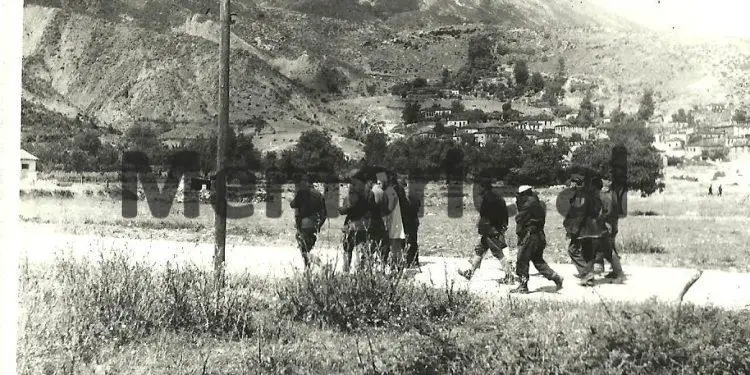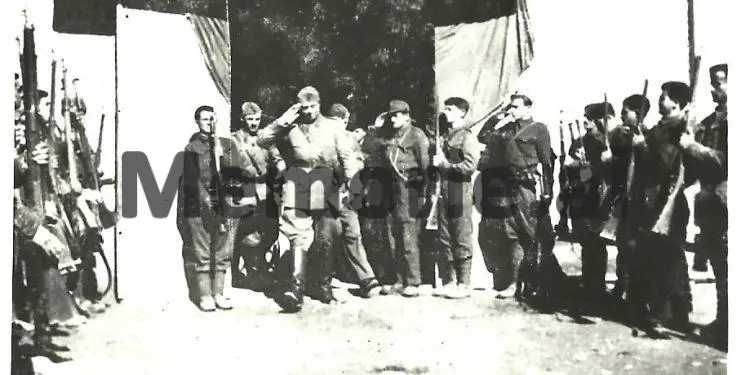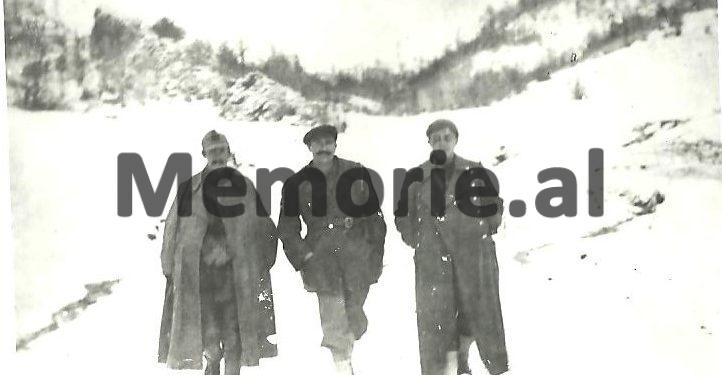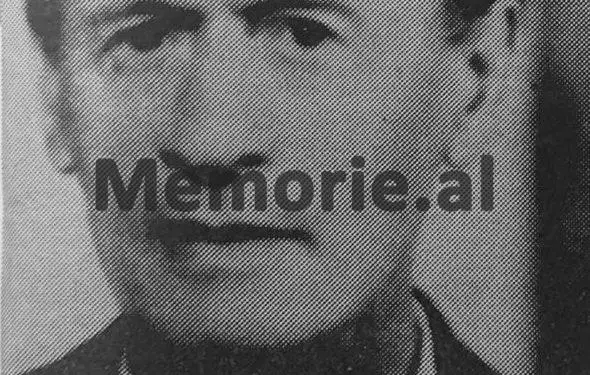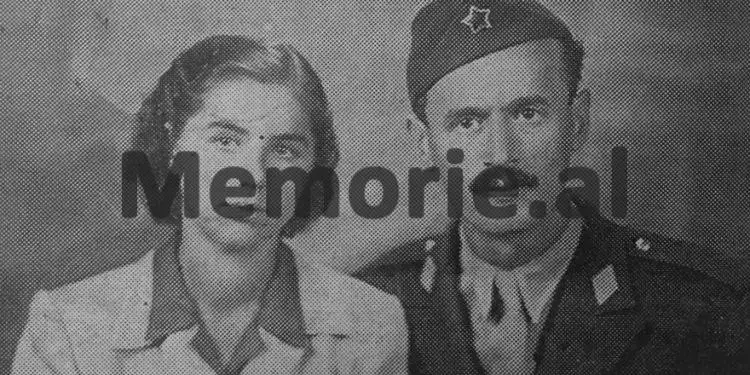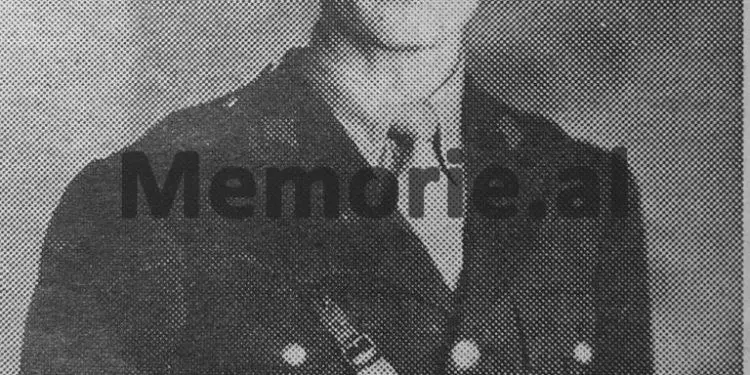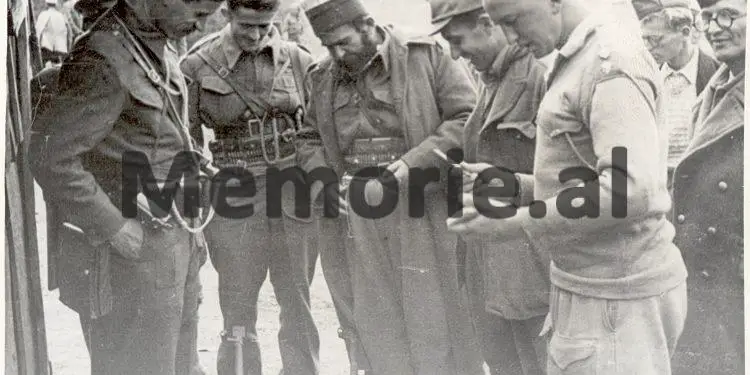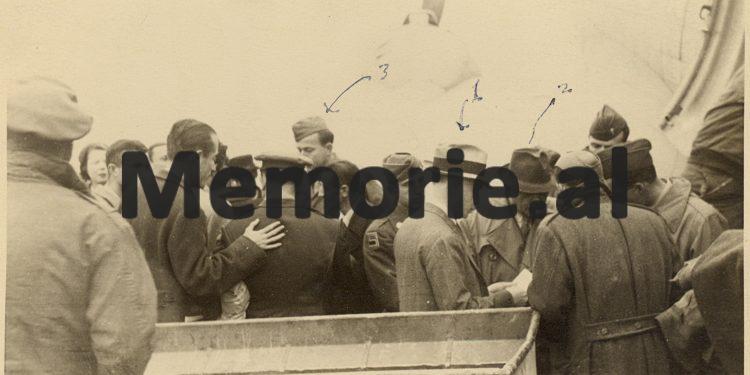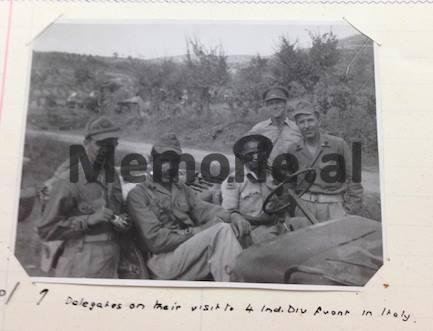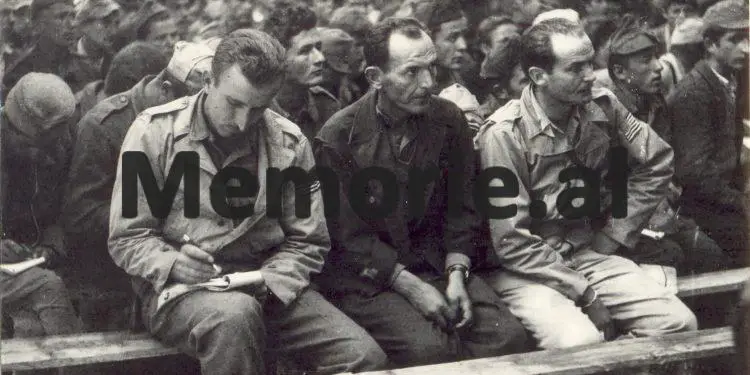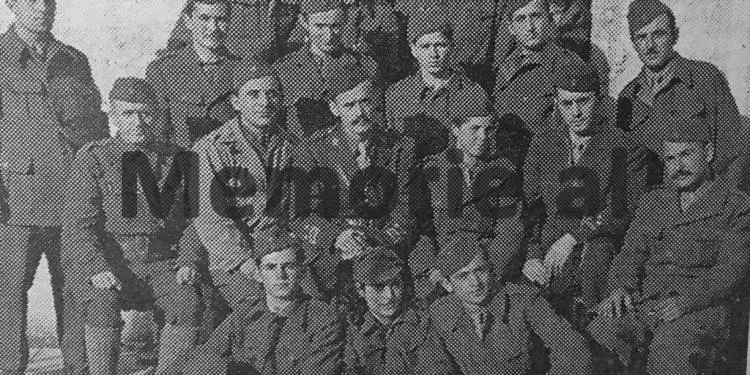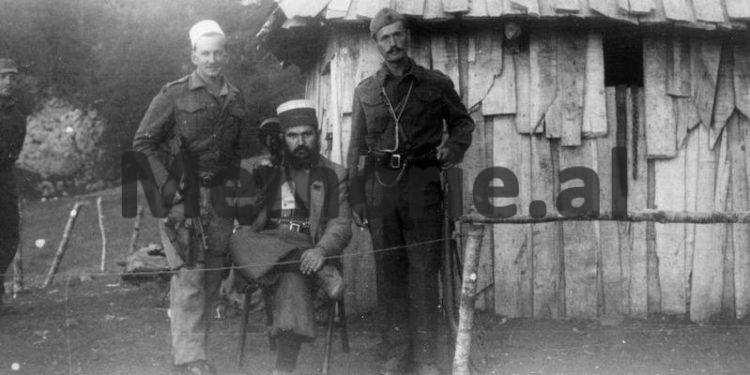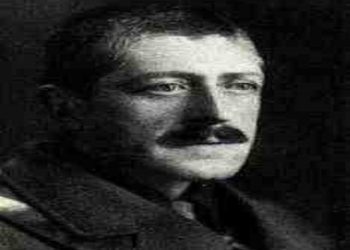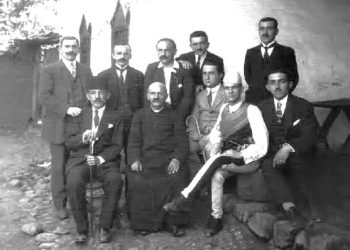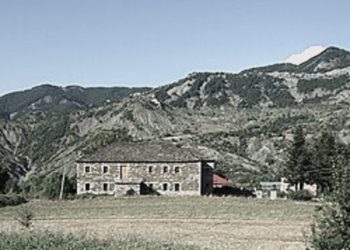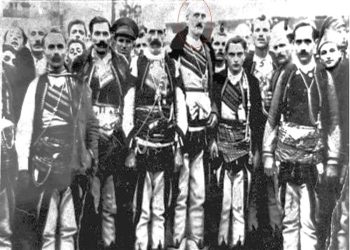Dashnor Kaloçi
Memorie.al publishes the unknown story of Kadri Hoxha, originally from Orenja of Çermenika, who after graduating from the American Technical School of Fultz in Tirana, gained a right to study and was sent to Naples to the Military College, where as a classmate he had Mehmet Shehun. Kadri’s expulsion from the College after debates with one of his professors regarding the occupation of Ethiopia by Italy and extradition to Albania, where he was held for several months in isolation in Durrës and then in Tirana at the Barracks of Ali Riza Kolonjë, from where he was interned in the Gramsh district, where several other communist-minded intellectuals were serving sentences. Kadriu’s meeting with Koço Tashko, from whom he received instructions and as a result of the great work he had done, at the meeting of November 8, 1941 where the Albanian Communist Party was formed, Kadriu was elected a member of the Central Committee and political secretary of the Elbasanit. Kadriu’s first conflicts during the war with the main leaders of the SNP, as he did not carry out Ramadan Çitaku’s order to steal the branch of Banca di Napoli where he worked and then the fierce debates with Enver Hoxha, which took place because he was removed from high party functions, first being sent to the Albanian Military Mission in Italy and then imprisoned and interned several times, being released on his own in 1991, when the communist regime collapsed!
“In March 1944, with the creation of the Seventh Assault Brigade, Kadriu was appointed as its commissioner, while the commander was Gjin Marku. But Kadriu did not go to the VII Brigade, as he was held at the General Staff, for the preparation of the materials of the Përmet Congress, where Kadriu was promoted to lieutenant colonel and he was one of the discussants who spoke at length in one of the sessions of that meeting… After the end of the Congress, Kadriu said to Enver: “I will go to the place where I was appointed as a commissioner in the VII Brigade, only when together we have clarified the problem of those letters that you have sent me”. (At that time, Enver Hoxha, through a letter, asked Kadriu to go with his forces to help Haxhi Lleshi). A few days later, Enver sent another order to Kadri, which he again did not carry out. Indignant at this, Enver writes to him again, saying: ‘You ‘Lila’, (Kadriu’s nickname), neither have you been, nor will you be the commander of Elbasan’. Kadri had saved Enver’s letters and tore them in his eyes, after he said to him: “Kadri they are things of the past, you do not have to remember them anymore”.
This is how Zyra Hoxha recalled, among other things, the first conflicts of her husband, Lieutenant Colonel Kadri Hoxha, one of the main exponents of the Anti-Fascist War, member of the Central Committee of the SNP since its founding meeting on November 8, ’44, and political secretary of Elbasan District, which due to debates and clashes with Enver Hoxha, would suffer imprisonment and internment until 1991, when the communist regime collapsed.
Who was Kadri Hoxha?
Kadri Hoxha was born in the village of Orenjë in Çermenika, Librazhd, on August 15, 1912. His father, Hazis Hoxha, in January 1920, was the personal bodyguard of Aqif Pasha of Elbasan and accompanied him to the Lushnja Congress. Hazisi at that time had a close friendship with the family of Beg Balla, who was known as the first house in all of Çermenika and was the main supporter of Aqif Pasha. When Kadri Hoxha was born, Beg Balla, as a sign of his friendship with Haziz, wrote Kadri’s name on the chimney of his house, considering him, a kind of with the other children of the Balla family. Kadri received his first lessons in his native village in Orenjë, and then he would continue them in Shëngjergj, where he kept him in his house, Ali Shtëpani, one of the most famous men of that province. Later, during the war, Ali Shtëpani’s house became a refuge and one of the main bases for Enver Hoxha and many other communist and nationalist exponents of the General Staff of the National Liberation Army.
From Fultz Technical School, to the Ustarak College of Naples
After spending several years in the school of Shëngjergji, with the intervention of some family friends, Kadriu was brought to Tirana where he enrolled in the dormitory “Naim Frashëri”. In 1930, after he finished the 7-year school with very high results, he was sent to attend the American Technical High School of Harry Fultz in Tirana, in the Electro-Mechanical branch, which he graduated with high results in 1934. After that, based on the high results, Kadria won a state scholarship from the royal government of the Zog Monarchy, to continue his studies at the Military College of Naples, in Italy. Initially, Kadriu did not want to continue his military studies, but he was encouraged and pushed by his school friend, Sadik Stavaleci, who told him: “You should go to study in Naples, because Albania should have its own staff military”. After that, Kadriu left for Italy and during the entire period of his studies at that Military College, he stood out as one of the best students of that school, as he was by nature a smart guy, but he also studied a lot. At the time, Kadriu had subscribed to two publishing houses, in France and in Romania, who occasionally sent him books and magazines with anti-fascist content, which he obtained illegally. He would then give these publications to his close classmate, Mehmet Shehu, who, without Kadriu’s permission, one day wrote to these publishing houses (on Kadriu’s behalf) to send them some other publications. These publications came to the class, which forced Kadriu to speak very harshly to Mehmet, as the deconstruction of those literatures automatically led to their expulsion from school. Mehmeti, as if to appease Kadri, shows him some of his poems written in English, where he had adapted “Omar Khajami’s Rubairat, mocking King Zog.” After reading them, Kadriu looked at his face and addressed his friend, Mehmeti, saying: “King Zog is not the evil of Albania in these moments, but Italian fascism, you have not written anything about this.”?!
Arrest by Italians and extradition to Albania
For the first time, Kadriu had come into contact with communist ideas, from the ranks of the American Technical School of Fultz in Tirana, by his friends, such as Sadik Stavaleci, etc. At that time, in one of the lessons, Kadriu retorted harshly to a professor of Philosophy, regarding the fascist occupation of Ethiopia by Italy. The Italian professor addressed Kadri, saying: “With these thoughts that you, Mr. Hoxha, will hang King Zog”. A few days later, Kadriu was arrested by the Italian authorities, who extradited him back to Albania, and he arrived in Durrës in February 1937. As soon as he disembarked from the passenger ship in the Port of Durrës, the Italian authorities accompanying him, handed Kadriu over to the relevant authorities of the Albanian Gendarmerie, which isolated him by holding him for three months in the investigation cells, at the “Ali Rizai” gas station on the outskirts of Tirana. After three months, he was interned in the district of Gramsh, where at that time several other intellectuals with anti-fascist convictions and activities were interned, such as: Nonda Bulka, Andrea Varfi, Selim Shpuza, etc. Three months later, after Kadriu went to Gramsh, that group of exiled intellectuals, of which Kadriu was a member, made a request to Zogu’s government to release them from exile. They also gave that petition to Kadri to sign, but he refused, saying that he did not feel guilty about anything he could have done at that time, to apologize to anyone! But after that request, all those intellectuals who had signed the petition, were released by King Zog, while Kadriu continued to suffer exile there in the district of Gramsh. The invasion of Albania by the fascist Italy of Benito Mussolini in April 1939, found Kadri in exile in the district of Gramsh, where he remained without civil rights. Taking advantage of the fall of the Albanian state after the Italian occupation of the country, Kadriu returned to his area of Elbasan, where he began to establish first contacts with various people who had embraced communist ideas. At that time, Kadriu went to Elbasan and met with Koço Tashko, who gave him the directives he had brought from the Comintern, where the main problem was the unification of communist groups for the formation of the Albanian Communist Party.
Member of the Central Committee of the SNP since November 8, 1941
According to the directives that Kadriu received from Koço Tashko, he did a great job of spreading them throughout the area of Elbasan. After several conversations with Koço Tashko, Kadriu was from the beginning a supporter of his idea that the Communist Party should be formed, and then the disputes between the groups should be settled. Given the great work that Kadriu had done in Elbasan, at the founding meeting of the Communist Party, on November 8, 1941, although in absentia, he was included in the lists of this party, as a member of its Central Committee. Although he was elected to that forum, no one informed Kadri about it. “The decision that I was elected to the Central Committee of the Albanian Communist Party, no one communicated to me, I saw it myself years later in the documents that the Yugoslavs had”, Kadriu testified years later in his memoirs. In December 1941, with the formation of the Political Circle for Elbasan, Kadriu was elected political secretary of this circle and a few days before Kadriu was elected to the post of communist leader for the Elbasan region, he was met by Ramadan Çitaku. At that time, Kadriu had been working for almost two years as a clerk in “Banka di Napoli” in the Elbasan branch. “We have an instruction and directive from the party, that you steal the bank of the Italians, that money is needed for the coffers of the Party, which is poor”, addresses Baca (Ramadan Çitaku) Kadriu, openly telling the purpose of his visit Elbasan. “I am a communist, but what you say is not done categorically,” Kadriu replied angrily. Outraged by this request of the Party, he forced Kadriu to take the road to Tirana and meet with Miladin Popovic. “What are these orders, I will never do such an action,” he told Miladin. Seeing Kadriu’s determination, Miladin softened the whole situation, supporting him in his decision. Shortly afterwards, at the first Communist Party Consultation held in Tirana, Kadriu came from Elbasan and discussed there, after Ymer Dishnica and Dali Ndreu. After that Consultation, Enver called Kadri separately, telling him that: he should choose a man, whoever he wanted, after being appointed by the Party, to go to the mountains and create the first partisan detachments. Kadriu wanted to take Sadik Stavelec, but since he was ill, he was forced to take Ramadan Çitaku.
Organizes the first squads in the area of Elbasan
According to the instructions he received from Miladin Popovic, Kadriu, together with Çitaku, were assigned to organize partisan detachments in the Elbasan region. Thus, at first, he went and asked for help to the family of Beg Balla, where he found full support and later connected with the family of Ali Shtëpani, in Shëngjergj, as well as those of Osman Distafa and Baba Fajë Martanesh. Thus, Kadriu managed to create the first Çermenika squad, with 11 men, where he was the commander. Later, he created the Martanesh gang, which he merged with that of Çermenika and appointed Baba Faja, the deputy commander, as his commander. With these small formations, Kadriu formed the first partisan battalion and with his initiative he started to take the first actions by attacking and eliminating some gendarmerie posts, both in Zdrajshen and in Cermenika, where he later established the power of the National Liberation Councils. Likewise, he went himself and removed the post-command of Shëngjergji, making Çermenika for a time, as the first free zone. Regarding this activity of Kadri Hoxha in that area, Enver Hoxha in his memoirs after the 1970s, would write: “… Our passage to the South failed even though the information given to us by the commander of the Elbasan Group, Kadri Hoxha, was totally wrong. He had neglected the importance of this enterprise, he stayed in Orenjë full of indifference, he quarreled with Beg Balla and the English, while the enemy acted and wreaked havoc. I sent him a letter, where I told him that the area of Elbasan militarily, continued to be very weak and responsible for this situation and for the failure of the passage of the Headquarters in the South, he kept in the first place “. In September 1943, with the forces he commanded in the fighting against the Italians in Pishkash, Kadri Hoxha captured a large Italian formation. After that, Kadriu is appointed by the General Staff of the National Liberation Army, as commander of the Elbasan Region. In March 1944, with the creation of the Seventh Assault Brigade (partisan), he was appointed as its commissar, while the commander was Gjin Marku. Although assigned to that task, Kadriu did not go to the VII Brigade, as he was held at the General Staff, for the preparation of the materials of the Përmet Congress. At this Congress, Kadriu was promoted to lieutenant colonel, and he was one of the longest-serving speakers in one of the sessions of that meeting. After the end of the Congress, Kadriu told Enver: “I will go to the place where I was appointed as Commissar, in the VII Brigade, only when together we have clarified the problem of those letters that you have sent me”. (At that time, Enver Hoxha, through a letter, asked Kadriu to go with his forces to help Haxhi Lleshi). A few days later, Enver sent another order to Kadri, which he again did not carry out. Indignant at this, Enver writes to him again, saying: “You ‘Lila’, (Kadriu’s nickname), have neither been nor will be the commander of Elbasan). Kadri had saved Enver’s letters and tore them in his eyes, after he said to him: “Kadri they are things of the past, you do not have to remember them anymore”.
Chairman of the Albanian Military Mission in Italy
In September 1944, Kadri Hoxha was assigned to go to Italy, as head of the Albanian Military Mission, at the General Command of the Allied Mediterranean Forces. Regarding this, among other things in his memoirs, Kadri Hoxha wrote: “Starting by motorboat from Spilea of Himara, which was sent by the Allied Command, on September 16 we arrived in Bari, Italy. There were four of us dressed in partisan clothes, with the weapons we had, pistols and German submachine guns and nothing else. In Bari, the Allies treated us not as foreigners but as their officers. We were housed in a large, furnished building that had been assigned to our mission. They provided us with clothing, food, transportation, automobiles and motorcycles, telephones and radio transmitters. At our request, other means of air, sea and land transport were made available to us to transport the wounded partisans to Italy, from Albania and vice versa. Also, to transport Albanians freed from Nazi concentration camps. In the beginning, the English even published a press in Albanian called “Mundimi”. At first our mission was small in number and we had very good relations with the Allied Quartet. After liberation, our mission changed its character. It took the form of a diplomatic mission and we were returning to “de facto” as ambassadors. At this time, there came other cadres appointed directly by Koçi Xoxe (Minister of Interior) and the number reached 33 people. There in the mission, a special section was assigned for the State Security, which maintained special direct links with the Tito military mission in Tirana, from which it received very special instructions. As a result, our mission’s relationship with the Allied Quartet deteriorated, demanding the removal of a person from our mission, calling him a “persona non grata.” This Albanian military mission was expelled by the Anglo-American Allies, in response to the expulsion of the Allied (Anglo-American) military mission from Albania, by order of Enver Hoxha, as a result of the directives he had received from the Slavs (Tito and Stalin emissaries) who were then in Tirana.
Kadriu: “Enver, do not break up with the Anglo-Americans”
Regarding Enver Hoxha’s decision to break with the Anglo-American Allies and expel them from Albania, Kadri Hoxha was the only member of the Central Committee of the Albanian Communist Party who came out openly against this decision. Thus, in the meeting of the Plenum of the Central Committee, which was held in Tirana from the end of April 1945, Kadri Hoxha, came out openly against, informing Enver Hoxha that it was a fatal action, and as a result of which England and America would not recognize the Albanian Government. At the same Plenum, Kadriu demanded that the real situation of the Communist Party (how many members it had) be made public and that it not hides behind the Front. During that session, Enver addressed Kadri, saying: “Regarding what you are saying, we have no indication that the Anglo-Americans will not recognize our government.” Kadriu insisted again after Enver’s words, expressing himself openly: “I am telling you, that they will not know us”. In this plenum Kadriu was left alone without any support and his opinion was not supported by any other member of the Central Committee.
The beginning of the blow against Kadri Hoxha
After the end of the mission in Italy, Kadri Hoxha, together with his wife, Zyra Avllazagaj, (former partisan in the Çermenika Battalion, who were married in December 1944), return by ferry to Durrës, on May 9, 1946. They are given neither work nor house (at a time when many exponents of the War occupied the main villas that were nationalized) and left available, staying at the Internacional Hotel. At that time, the Albanian Communist Party distributed the Party cards and Kadriu was called by Major General Dali Ndreu to his office, and did not report to the meeting, although he was a member of the Central Committee. After this, the revolted Kadriu addresses Dali: “This game that is now being played on my back, I wish it would not be played on your back later”. Kadriu said these words to Daliu, after he asked him what was discussed in that Plenum, and Daliu replied: “Ask your friends”! In the elections of December 2, 1945, Kadriu was elected as a deputy of Elbasan and in one of the vacations, between the sessions, he was called by Gogo Nushi, who told him: “I have an order from Enver Hoxha, to announce that you have been appointed director of the Branch of Bank of Berat”. Kadri objected, saying he was in the military and that he had to demobilize Enver before he could give the order. But during the plenary sessions, Kadriu opposed the bill that unified the Albanian currency with the Yugoslav one, as well as abstained from some legal issues. “Since the time we were in Italy, Kadriu clearly felt the situation in which he was. He addressed me, telling me that for us, there are only two options: Either go to Albania and be subjected to persecution, or stay in Italy and see our work. “But if we do the latter, they will call us traitors, without being like that”, said his wife, Zyraja, who supported Kadri in his decision to return to Albania. “Analyzing the situation, we were in, we decided to go to Albania and meet Enver Hoxha, in his villa. When we got there, Enver did not come out to meet us at all, but his mother did. We knew he was home because we saw his car outside, along with the people guarding it. In the end, we found it reasonable for Kadriu to make a formal request to be demobilized from the army, as he was listed as a military man. The request for demobilization was approved immediately and after that, Koçi Xoxe called him to his office, where he said: why did he ask for the usual permission?! Kadriu replied, saying: I did not ask permission from you, but from the Ministry of Defense, where I serve as an effective. After many harsh words they exchanged with each other, Koçi told him not to be upset, as they would find him a job. “I do not want a job to eat a piece of bread,” Kadriu replied to Koçi, “the Office recalls, regarding that debate, as Xoxe thought that Kadri Hoxha had not asked for permission to flee Albania. this, as he in Italy, was regarded as a capable diplomat and his escape could bring problems to Enver Hoxha.
Arrested in Gogo Nushi’s office
On February 3, 1947, Kadriu summoned Gogo Nushi to his office in the Central Committee and he communicated the decision to go to Ballsh. Kadriu objected, telling Gogo why that decision was made for him. “You abstained in the Assembly and whispered all over Tirana,” Gogo told several officers, who tied Kadri with a rope. He was then put in the car that was waiting for him outside the Central Committee, to be sent to Ballsh. On the same day, some officers of the Ministry of Internal Affairs took his wife, Zyra from the “Internacional” hotel, where he was still staying, and sent her to Ballsh. “What did Kadri do to send us there,” I said?! “We sent him to improve,” one of the armed officers told me. When I arrived in Ballsh, I was taken to the Defense Section, where I found Kadri. There they kept us isolated for three days. After three days, they gave us a military tent and we stayed there from the beginning of February until May of that year. Kadri was instructed that whoever asked him, he should tell him that we had not gone to Ballsh in exile, but ostensibly as a petroleum engineer, who would wait for some Yugoslav specialists. On May 16, a car arrives with some officers who tell us that by order of General Koçi Xoxes, we would have to go to Tirana. They put us in the car without tying us up and sent us to Vlora and exactly to the Internal Branch of the city. There, its chairman told us: ‘In the name of the general and the people, you are arrested’. ‘Both’?! said Kadriu. “Yes,” he replied, “as long as it does not divorce you.” “With what motivation do you arrest us?”, “You abstained in the Assembly and opened words in Tirana, that you will become great”, said the chairman of the Branch. “Yes, I was a great deputy, a member of the Central Committee of the Communist Party in Italy and a military man,” Kadriu told. The next day they brought us to Tirana, where Kadri was locked up in the ‘New Prison’, while I was in the cells of the Directorate of Internal Affairs in Tirana. In January 1949, after Enver beat Koçi Xoxe, I was released from prison, while Kadriu went to trial and was convicted as an ‘Anglo-American agent’ and he was released in 1951. After his release from prison, Kadriu worked in the Ministry. as ‘head of soft drinks’ and later at the ‘Enver’ Plant. In 1956, after the Tirana Conference, Kadriu was arrested again and the investigator was held for 6 months. After being released from the investigation, Kadriu goes to Vlora, where he is assigned to work as a storekeeper, in the Construction Company “Perlat Rexhepi”. A year later, I went to Vlora, where I stayed with my husband until 1961, when he was interned on the island of Zvërnec. He stayed there until 1964 and then he was interned again sending him to Selenica, where he stayed until 1967. After ’67, we reunite again in Vlora and later Kadri is asked to write ‘History’ of the Elbasan War ‘. Knowing the consequences that awaited him, he wrote it down and sent it to Elbasan. After that, Kadriu is arrested again and sentenced to 8 years in prison. The trial was allegedly held in Vlora, but in fact Aranit Çela and Irakli Bozo had come there to give instructions. Kadriu was serving an eight-year sentence in Bënçë and Burrel prisons. After my release in 1981, we reunited again in Vlora, where we lived only on my salary, as I worked in the Kanina quarry. In 1985, we were deported again to Selenica, where we stayed until 1991. In January 1991, some people from the Tirana Directorate of Internal Affairs came to us and started pressuring us, telling us why we had come. in Tirana. “Our internment is over and now we are free citizens and we can go wherever we want,” Kadriu replied. “We will take you by car to take you back there,” they scolded us. “If you do this, I will make a scandal for all of Tirana to find out,” Kadriu replied. “Okay, we just want you to shut up,” they tried to reassure him. “Enver Hoxha could not shut my mouth and not you”, he replied to them “, recalled Kadri Hoxha’s wife, Zyraja, who together with her husband, Kadriu, for several years lived somewhere on the outskirts of Tirana, where she was deported by the employees of the Executive Committee of Tirana in 1991, after the “rehabilitation” of her husband, Kadri Hoxha, who remained a victim of his ideals./Memorie.al




